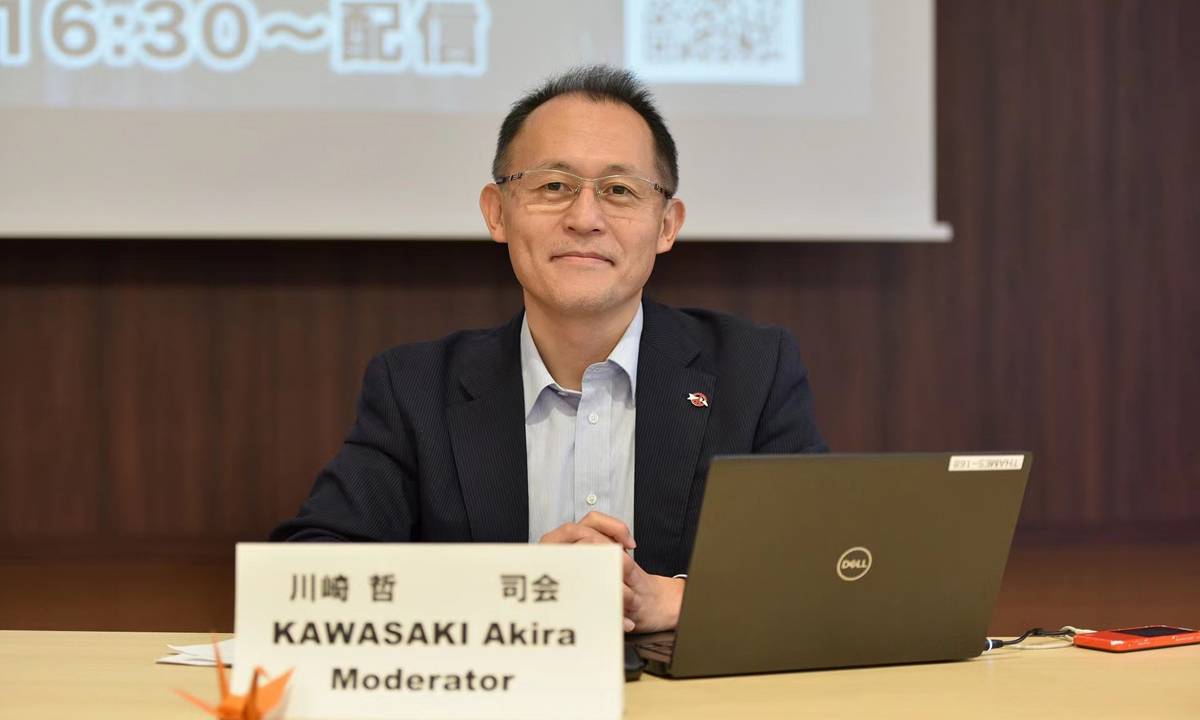This year marks the 50th anniversary of the normalization of diplomatic relations between China and Japan. In recent years, it seems Tokyo has chosen to tilt toward Washington and show growing hostility to Beijing. Meanwhile, the risk of Japan returning to its old militaristic path has worried not only regional countries, but also the global community. Akira Kawasaki (Kawasaki), a member of the Executive Committee of the Tokyo-based non-governmental organization Peace Boat, talked about related issues, including the peace-promoting activities of his organization and the future of the China-Japan relationship, with Global Times (GT) reporter Xia Wenxin.
GT: Can you tell us more about Peace Boat? What type of cooperation have you had with China?
Kawasaki: Peace Boat, founded in 1983, conducts educational programs on peace, environment and sustainability through its global voyages with a large passenger ship. Originally it started as a voyage by Japanese youth to learn from past history to build peace by visiting such cities as Nanjing and Hiroshima, with a firm commitment to not repeat the mistake of waging another war. In recent years, more and more Chinese people are getting onboard our global voyages as passengers, enjoying tourism as well as social and cultural programs in various parts of the world.
GT: Many Japanese participants of Peace Boat's voyages are shocked to listen to the memories of victims of their country's atrocities during World War II (WWII), because the Japanese education system largely avoids that part of history. Do you think Japan is forgetting its WWII history? What negative impact does it have on Japanese society?
Kawasaki: The government of Japan has systematically erased the description of Japan's brutal and criminal acts to its neighbors in the lead-up to and during WWII in history textbooks, pushed by right-wing politicians. So has the mass media, which tends to disseminate provocative statements and comments by historical revisionists over such issues as the Nanjing Massacre or military sex slavery practices, known as "comfort women." These have made Japanese people, especially youth, unaware of the basic facts in history that Japan was the aggressor in WWII. This is causing problems for Japan to promote mutual understanding and friendship with its neighboring nations.
GT: As a peace activist, you have been endeavoring to educate Japan's younger generation about their country's war history. Have you ever faced any opposition or obstruction in Japan? If so, could you give us some examples?
Kawasaki: Hate speech has been promoted against those who publicly focus on the negative side of Japan's history, including through social media. In some extreme cases, they blackmail and force some public events to cease to take place. Legal measures to control these attacks are being established but have not been sufficient.
GT: To a large extent, the US is taking the war in Ukraine as an opportunity to continue weakening Russia. Many believe that Washington is trying to "copy and paste" a Ukraine crisis in Asia. Do you think Japan will become a US pawn or even end up in war?
Kawasaki: I do not see any reasonable ground to discuss security issues in East Asia in the analogy of what is taking place in Ukraine today despite that Japanese and Western media often do talk about what if the same takes place in Taiwan or even in Japan. The lesson of the Russian war on Ukraine is that every nation must remain committed to the principles of the UN Charter and all conflicts should be resolved in a peaceful manner. I believe all responsible nations in our region, including Japan and China, are learning the lessons and acting accordingly.
GT: As a core member of the International Campaign to Abolish Nuclear Weapons (ICAN), how do you view the establishment of AUKUS? Does it exacerbate the risk of nuclear proliferation in the Asia-Pacific?
Kawasaki: Australia obtaining a nuclear submarine triggers the risk of undermining the nuclear non-proliferation regime. This would also promote an arms race in the Asia-Pacific. The ICAN calls on all nations, including Australia, Japan and China, to advance nuclear disarmament by joining the Treaty on the Prohibition of Nuclear Weapons (TPNW).
GT: Do you think there might still be a turning point for China-Japan relations to improve? How can it be realized?
Kawasaki: There is serious mistrust between Japan and China, which must be addressed and mitigated. China's perception of Japan as a hostile threat mirrors how Japan today sees China. Mutual mistrust is promoting an arms race, which would not benefit Chinese or Japanese people. Mutually collaborative efforts, including in civil society, need to be made for better understanding and dialogue.




No comments yet
Be the first to share your thoughts!